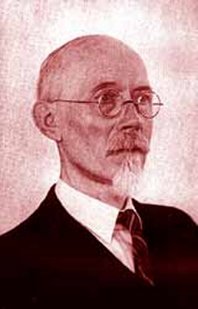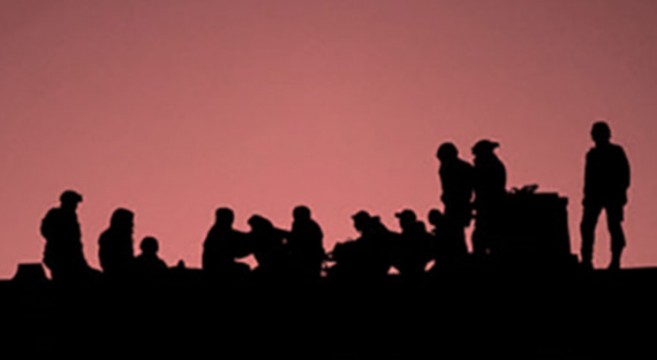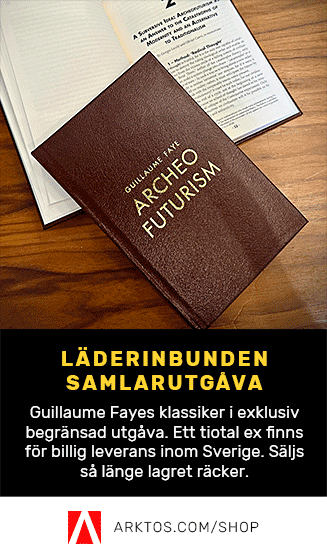Under åren har något av en tradition utvecklats på bloggen, där det på första maj tas upp ämnen med koppling till den historiska socialismens och arbetarrörelsens mindre kända aspekter och företrädare. Så har bland annat Ferdinand Lasalle, det ryska kommunistpartiet, Georges Valois och Karl Paetel tagits upp. Gemensamt för dessa är att de demonstrerar att den i vänstern idag dominerande synen på bland annat sådant som nationen inte är en nödvändighet, att vänstern för att citera Frank Baude kort sagt inte hade behövt bli så ”medelklassig”.
En intressant tendens i vänsterns historia var rådssocialisterna eller -kommunisterna. Strömningen uppstod i samband med den ryska revolutionen, inspirerad av de råd, sovjeter, som mer eller mindre spontant bildades av bland annat arbetare och soldater. Liknande råd uppstod bland annat i Tyskland under revolutionen 1918, det finns även flera gemensamma drag mellan råden och Pariskommunen 1871. Om man utgår från Dugins resonemang om fyra politiska teorier är det inte långsökt att betrakta rådsmodellen som den andra politiska teorins, socialismens, egentliga kärna (på samma vis som Männerbund är den tredje politiska teorins, fascismens, egentliga kärna, även om alla de tre politiska teorierna i praktiken koopterades av den moderna staten).

– Anton Pannekoek
Det finns en uppenbar konflikt mellan en kamp som förs av arbetarråd och en kamp som förs av leninismens avantgardistiska parti, historien torde ha besannat rådssocialisternas varningar för vad leninismen skulle leda till. Så fanns det också en konflikt mellan rådssocialister och leninister. De förra uteslöts därför ofta ur de större kommunistpartierna och bildade egna organisationer som på sikt tynade bort.
Det arv de lämnat efter sig är dock ofta av intresse, och återknyter i högre grad till en genuint europeisk världsåskådning än många andra tendenser inom vänstern. Om man likt Aleksander Dugin söker identifiera det värdefulla i alla de tre politiska teorierna finns det därför mycket av intresse hos Pannekoek, Gorter och Rühle.
Antropologi – arbete som fri aktivitet
Free spontaneousness in the use of muscles and nerves, all in their turn, in following every whim, in work or play, lies at the bottom of human nature. The constraint of his needs compels man to regular work, to suppression of the impulse of the moment, to exertion of his powers, to patient perseverance and self-restraint. But this self-restraint, necessary as it is for the preservation of oneself, of the family, of the community, affords the satisfaction of vanquishing impediments in himself or the surrounding world, and gives the proud feeling of reaching self-imposed aims. Fixed by its social character, by practice and custom in family, tribe or village, the habit of regular work grows into a new nature itself, into a natural mode of life, a harmonious unity of needs and powers, of duties and disposition. Thus in farming the surrounding nature is transformed into a safe home through a lifelong heavy or placid toil. Thus in every people, each in its individual way, the old handicraft gave to the artisans the joy of applying their skill and fantasy in the making of good and beautiful things for use.
All this has perished since capital became master of labor.
– Anton Pannekoek, Workers’ Councils
Den rådssocialistiska antropologin påminner delvis om anarkismens och gillesocialismens, då fokus ligger på människans frihet och värdighet (detta är kort sagt inte en ”kniv-och-gaffel-”socialism, för att återknyta till Novatore). Hos Pannekoek anar man tankar som påminner om Evolas distinktion mellan arbete och fri aktivitet.
Antiparlamentarism
In the councils, the workers are represented in their natural groups, according to factories, shops and plants.
When the revolution develops to such power that the State power is seriously affected, then the workers’ councils have to assume political functions. In a political revolution, this is their first and chief function. They are the central bodies of the workers’ power; they have to take all measures to weaken and defeat the adversary. Like a power at war, they have to stand guard over the whole country, controlling the efforts of the capitalist class to collect and restore their forces and to subdue the workers. They have to look after a number of public affairs which otherwise were state affairs : public health, public security, and the uninterrupted course of social life. They have to take care of the production itself; the most important and difficult task and concern of the working class in revolution.
– Pannekoek, Workers’ Councils
Denna antropologi är också svår att förena med övertron på en närmast metafysisk representation, kampen måste kort sagt föras direkt av arbetarna snarare än av föreställda representanter för dem (arbetarråden byggde på att representanter kunde återkallas när de inte längre hade medlemmarnas förtroende). Detta leder hos rådssocialisterna till en kritik av både parlamentarism, partiväsende och fackföreningar. En kritik de delar med den äldre högern, om än från delvis andra utgångspunkter.
What are the foundations of the new society? They are the social forces of fellowship and solidarity, of discipline and enthusiasm, the moral forces of self-sacrifice and devotion to the community, the spiritual forces of knowledge, of courage and perseverance, the firm organization that binds all these forces into a unity of purpose, all of them are the outcome of the class fight.
– Pannekoek, Workers’ Councils
Så skriver Pannekoek i Party and Class:
The old labor movement is organized in parties. The belief in parties is the main reason for the impotence of the working class; therefore we avoid forming a new party — not because we are too few, but because a party is an organization that aims to lead and control the working class. In opposition to this, we maintain that the working class can rise to victory only when it independently attacks its problems and decides its own fate.
I kritiken av partier, fack och parlament anar man återigen en släktskap med den äldre högern och distinktionen mellan massa och naturliga grupper. I parlamentet företräds individen som en del av en massa, men arbetarrådet är den naturliga grupp där man istället är en person. Detta resonemang utvecklas inte alltid explicit hos rådssocialisterna, men det är en positiv ansats.
Den nya staten och den nya klassen
The development towards state-capitalism – often propagated under the name Socialism in Western Europe – does not mean the liberation of the working class but greater servitude.
– Pannekoek, Letter on Workers’ Councils
Rådssocialisternas mest produktiva tid var de händelserika 1920- och 30-talen. Intressant är att de kunde identifiera fragment av den metamorfos systemet då började undergå, och de klassintressen som var inblandade. Den gamla högern i bland annat USA menar att tiden kring 1930-talet innebar något av en revolution, där Roosevelts New Deal i grunden förändrade landet. Otto Rühle talar här istället om statskapitalism, men är inne på liknande tankegångar. Han skriver i Which Side to take:
This system entered its last phase with the first World War. It is now in a life-and-death struggle against the ascending new phase, which we describe as state-capitalistic. Just as the first one found its ideological and political expression in Liberalism and Democracy, so the second finds its expression in Fascism and Dictatorship. Democracy was the state form of capitalist ascendancy, of its struggle against feudalism, monarchism and clericalism, of the unfolding of all individual powers for the victory and rise of the capitalist economic system, for the social setting and cultural endowment of the bourgeois order. This ascending period ended long ago. Democracy becomes more and more inadequate and unbearable for present day capitalism, for the capitalistic interests can no longer live and grow under it. They demand new social and political conditions, a new ideology and a new state form — a new ruling apparatus. The democratic phase is discarded and demolished in order that fascism can take its place. For only under fascism can state-capitalism develop and thrive.
Avlägsnandet från liberala och demokratiska former blev inte lika dramatiskt i rika länder som USA och Sverige som i exempelvis Tyskland och Sovjet, men tendensen är uppenbar (dagens USA är exempelvis en oligarki med demokratisk fernissa, en hybrid av ”kapitalism” och ”socialism”). Gottfried talar här om en ”managerial state” som senare utvecklas till en ”therapeutic state”. I en sådan får ”socialister” en kvalitativt ändrad roll och relation till systemet. Pannekoek identifierar denna förändring genom att skilja mellan ”common ownership” och ”public ownership”, det senare i högsta grad förenligt med statskapitalism. Han skriver i Workers’ Councils:
Common ownership must not be confounded with public ownership. In public ownership, often advocated by notable social reformers, the State or another political body is master of the production. The workers are not masters of their work, they are commanded by the State officials, who are leading and directing the production. Whatever may be the conditions of labor, however human and considerate the treatment, the fundamental fact is that not the workers themselves, but the officials dispose of the means of production, dispose of the product, manage the entire process, decide what part of the produce shall be reserved for innovations, for wear, for improvements, for social expenses, what part has to fall to the workers what part to themselves. In short, the workers still receive wages, a share of the product determined by the masters. Under public ownership of the means of production, the workers are still subjected to and exploited by a ruling class. Public ownership is a middle-class program of a modernized and disguised form of capitalism. Common ownership by the producers can be the only goal of the working class.
Gottfried kopplar denna förändring av produktionsförhållandena till en social grupp, ”den nya klassen”, och till en ideologi, kulturmarxismen. Historiskt har den äldre högern också varit mycket skeptisk till de intellektuella (idag ofta en del av den nya klassen genom sin relation till staten). Intressant är att Pannekoek närmar sig denna insikt. Han skriver i Workers’ Councils:
Among the Western intellectuals, however, Russian bolshevism attracts ever more attention.
Under the rule of big capitalism it is the class of intellectuals that has the technical lead of production, and the spiritual lead of society in its hands. Now it begins to ask — in so far as it is not entirely occupied by its narrow personal job — why shareholders and stock jobbers should have the upper command over production. It feels itself called upon to lead social production as an organized process, to throw off the dominance of a parasitical bourgeoisie and to rule society. It is divided, however, in a series of higher and lower ranks, arranged after usefulness or what else; they form a ladder on which, in mutual rivalry, one may ascend by ambition, capacities, favor or cunning. The lower and badly paid ranks among them may join the fight of the working class against capital. Its higher and leading elements, of course, are hostile to any idea of mastery by the workers over the process of production. Their prominent thinkers and learned scholars, often refined or ingenious spirits, strongly feel their superiority threatened by the phantom of a general ”levelling.” The intellectual class feels quite well that its ideal of social order cannot exist without a strong power apparatus, to keep down private capital, but chiefly to keep down the working masses. What they want is a moderate dictatorship, strong enough to resist attempts to revolution, civilized enough to dominate the masses spiritually and to assure a rational liberty of speech and opinion to the civilized; anyhow, without the rough violence that made national socialism the object of hatred all over Europe. A free road to the talented, and society led by the intellectual elite, such is the social ideal rising in this class.
Den sista meningen sammanfattar mycket väl den nya klassens självbild, även om man bör vara medveten om att både Rühle och Pannekoek inte hade möjlighet att följa statskapitalismens och den nya klassens vidare utveckling och den ideologi som kom att bli deras. Den ideologi vi idag kallar politisk korrekthet, vänsterliberalism eller kulturmarxism, och Frank Baude summerar som medelklassig (”nyklassig” är mer korrekt men även ett språkligt missfoster).
Intressant är också den syn på kampen mellan Dugins ”tre politiska teorier” bland annat Rühle uttrycker. Idag är det en central del av den officiella ideologin att USA var bättre än Sovjet, men att Sovjet var bättre än det bottenlöst onda, radikalt andra, Tyskland. Rühle tycks avvisa denna mytisering av en komplex historisk verklighet, och det val mellan tre onda ting det förutsätter. Han skriver i Struggle against Bolshevism:
There can be no question that parliamentarianism is entirely degenerated and corrupt…. Fascism is merely a copy of bolshevism. For this reason the struggle against the one must begin with the struggle against the other.

– Otto Rühle
Pro et contra
Marx was not a team worker. He was not a man of comradely spirit, not one of those whose powers are intensified by the sense of living community with others. He was not a rank-and-file fighter.
He could only create as first in the field; could only fight as generalissimo; could only conquer when assigned the heroic role. He was a lonely eagle upon an icebound crag.
– Otto Rühle, Karl Marx His Life and Works
Man kan alltså identifiera flera värdefulla inslag hos de historiska rådssocialisterna. Där finns en antropologi fokuserad på frihet och värdighet, och en till detta knuten kritik av parlamentarism, fackföreningar och partier. Rådssocialismen är på så vis ett försök att motverka och minimera Robert Michels ”oligarkins järnlag”. Där finns också ett embryo till en teori kring massa och naturliga grupper, och ett federalt ideal. Hos Pannekoek och Rühle kan man också identifiera en analys av teman som bland annat Gottfried senare studerat närmare. Den attityd Rühles kritik av bolsjevismen och de intellektuellas ”socialism” utgår från hade också varit av värde idag, riktad mot nya systemförsvarande ideologier.
Samtidigt finns det svagare sidor hos den historiska rådssocialismen. Så är antropologin inte differentierad, vilket gör att det för rådssocialisten alltid förblir en obehaglig överraskning när ”arbetarklassen” inte agerar mot bland annat kapital och bolsjeviker. Detta beror på att människor är olika och inte alla arbetare tillhör samma människotyp som den samtidigt mycket politiske och idealistiske Pannekoek (man behöver inte vara frenolog för att se på porträtt av Pannekoek att han var en person som under alla andra historiska epoker blivit präst eller munk). Pannekoeks vision är den vackrare, men Lenins antropologi har historiskt visat sig mer realistisk.
Rådssocialismen är också endimensionell i sin proletarism. Historiskt har (indo-)europeiska samhällen utgått från att det finns åtminstone tre olika funktioner i ett samhälle, var och en med sin karaktär. Rådssocialismen reducerar, i likhet med ”proletariatets diktatur”, dessa till en enda och människan till arbetare. I praktiken åtföljs detta mål av mer eller mindre långtgående försök att utplåna sociala grupper av icke-arbetare (från Ukrainas kulaker och kosacker till Spaniens präster och nunnor). Man kan också fråga sig om gemensamt ägande och frihet i längden är förenligt, eller om tron att detta är möjligt hänger samman med den utopiska sidan hos bland annat Pannekoek. Hit hör också rådssocialismens historiskt relativt starka koppling till antinationalistiska positioner, ett uttryck för en samtidigt odifferentierad och utopisk världsbild.
Det finns kort sagt flera brister hos rådssocialismen. Styrkan är rådsmodellen, vilken påminner både om inslag i det förmoderna samhället och om Per Engdahls vision av det självägande företaget. Som en del av ett sundare Europa har det en given plats, och kan tillämpas bland annat på vissa företag.
Vidare läsning
Marxists.org – Anton Pannekoek-arkiv
Marxists.org – Otto Rühle-arkiv
De nationella rådssocialisterna – Wolffheim och Laufenberg
Die Frage der Sozialisierung wird zu einer nationalen Frage im vollsten und eigentlichsten Wortsinne.
– Laufenberg
Två av de tyska rådskommunisterna är idag relativt kända i vänsternationalistiska kretsar. Det rör sig om Fritz Wolffheim (1888-1942) och Heinrich Laufenberg (1872-1932). Under den tyska revolutionen 1918 valdes Laufenberg till ordförande för arbetar- och soldatråden i Hamburg, Wolffheim deltog också aktivt. När de uteslutits ur det tyska kommunistpartiet på grund av sin vänsterkommunism var de med och grundade det antiparlamentariska och vänsterkommunistiska KAPD (Kommunistische Arbeiter-Partei Deutschlands).
As a new social principle of organization and administration, the council system opposes to municipal politics, which is the basis of the private economy, and therefore of capitalist society, the idea of the union of all those who work in production on the basis of the nature and location of their production… Until now, the ties of nationality have been based upon coercion from above. The new system will organize the nations from below. And it is precisely due to this fact that the new system will obtain the security which will allow it to prevail over the old, which no foreign forces will be able to prevent or oppress, and which will bring in its wake, in all regions and throughout the world, with the guarantee of domestic invincibility, the possibility of the unlimited expansion of the world socialist order.
– Heinrich Laufenberg
De betraktade nationalism och socialism som förenliga, Laufenberg beskrev arbetarråden som den socialistiska nationens ”urceller”. Han summerade klassens intressen som ”socialismen och nationen”. Laufenberg återknöt till Lasalle, och ersatte delvis fixeringen vid arbetarklassen med konflikten mellan den stora majoriteten och en liten del av bourgeoisien (idag skulle de sannolikt kallas ”the 1%”, deras intressen är transnationella). Gradvis kom de också att se ”ärliga nationalister från höger” som tänkbara samarbetspartners. Laufenberg gick bort 1932, men Wolffheim fortsatte verka för den samtidigt nationalistiska och rådssocialistiska staten. Bland annat samarbetade han med Karl Paetel. Hans nationalistiska övertygelse gjorde inte att han skonades i det Tredje riket, och 1942 dog den judiskättade patrioten och rådssocialisten i koncentrationsläger. För vänsternationalister som inte vill förfalla till statskapitalism är de båda rådssocialisterna fortsatt av betydande intresse.
Vidare läsning
Fritz Wolffheim – Wikipedia
Heinrich Laufenberg – Wikipedia
Fritz Wolffheim – Das Jüdische Hamburg
Fritz Wolffheim – Factory Organizations or Trade Unions?
Hans-Werner Klausen – Zusammenschluß der Arbeiter und der Nation: Heinrich Laufenberg, Fritz Wolffheim und der Hamburger Nationalbolschewismus
The Hamburg revolution – Heinrich Laufenberg











